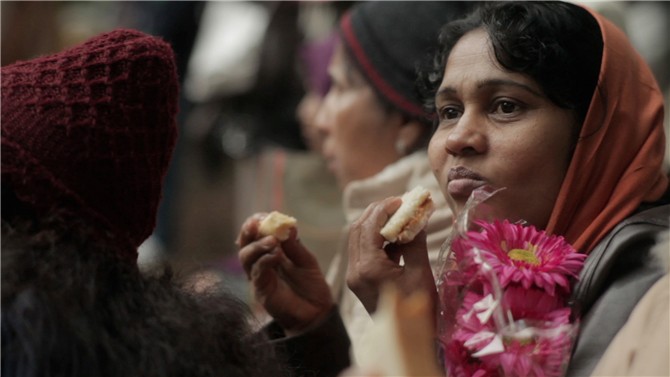Iva Radivojevic is an award-winning filmmaker who spent her early years in Yugoslavia and Cyprus before settling in NYC over a decade ago. Her work explores the themes of identity, migration and immigrants. Radivojevic’s films have screened at numerous film festivals and showcases including, SXSW, IFF Rotterdam, HotDocs, PBS, The Documentary Channel and The New York Times Op-Docs. Radivojevic was named one of the 25 New Faces of Independent Film of 2013 by Filmmaker Magazine. (Press materials)
Evaporating Borders will play at the Human Rights Watch Film Festival on June 17.
W&H: Please give us your description of the film.
IR: Evaporating Borders is an experience. The viewer is taken on a journey through the island of Cyprus. The [film] centers around the lives of those people who are in the lowest of society’s [hierarchy]: refugees.
It’s also an essay film, almost like a stream of consciousness, and that stream gives way to other characters that show up along the journey. It feels like a cinematic commentary on the issues of tolerance, discrimination, displacement, and belonging. It’s visual and poetic, and yet very political.
W&H: What drew you to this story?
IR: Immigration issues and migrants’ rights are themes that are important to me.
When the war in Yugoslavia broke out in 1992, my mother, sister, and I moved to Cyprus. I later came to study in New York and have lived here since.
Over the years, I have often visited family in Cyprus. In the 2000s, [political conflict] had shifted from Eastern Europe to the Middle East and Africa, and the attitudes toward these new migrants shifted as well. The environment grew more intolerant each time I’d visit. The migrants from the Middle East were particularly targeted and subjected to institutional racism, attacks, and so on.
These attitudes are not specific to Cyprus. They are global. The thoughts and observations I had while growing up in Cyprus and later during my visits had churned my stomach for a while and wanted to express themselves.
W&H: What was the biggest challenge in making the film?
IR: Representation. Who is talked about, how, and by whom? This is a crucial question. I wanted to be as transparent as possible about who the narrator is and where they are coming from. Knowing that, the viewer can make their own assessment about what they are seeing. It was important for me not to blame or victimize and instead turn that questioning inward, self-reflect, and consider my own participation in what I was witnessing. And then attempt to invoke the same in the viewer by providing the atmosphere in which they can question themselves and have a self-reflective moment, a transformative experience.
W&H: What advice do you have for other female directors?
IR: Don’t worry too much about how and what to do, and don’t wait for the perfect situation to come about. Start making things now. The results will probably be crappy at the beginning, but the more you do/create, the better the work will get. One day you will wake up and you’ll be doing exactly what you love. Somewhere along the way, get a mentor. It helps.
Also find each other, inspire, guide and help each other.
W&H: What’s the biggest misconception about you and your work?
IR: It’s difficult to describe the work in words. The film offers a visual and auditory language in which everything flows and moves with a purpose to deliver an emotional response in the viewer. To limit this cinematic experience to words or a simplified description/synopsis is crippling, and therefore can never fully represent what the film is.
Evaporating Borders is political and deals with intense issues. Describing it in words can render the film as having a style of an activist or advocacy film, and since it’s narrated by me, it can also be mistaken for a personal quest film. In reality, it’s neither of those things.
I’m careful not to call myself a social documentarian or a documentary filmmaker. Labeling the work to one specific genre or style is constricting. Creation is an organic process; it changes and morphs.
W&H: Do you have any thoughts on what are the biggest challenges and/or opportunities for the future with the changing distribution mechanisms for films?
IR: There are many interesting venues out there for films that are not easily distributed in the traditional way. Platforms like Tugg and Vimeo On Demand for VOD are exciting. The trick to all of it is marketing.
W&H: Name your favorite women directed film and why.
IR: 35 Shots of Rum by Claire Denis. Everything about this film is gorgeous. The subtlety, the color palette, the quiet emotion.






